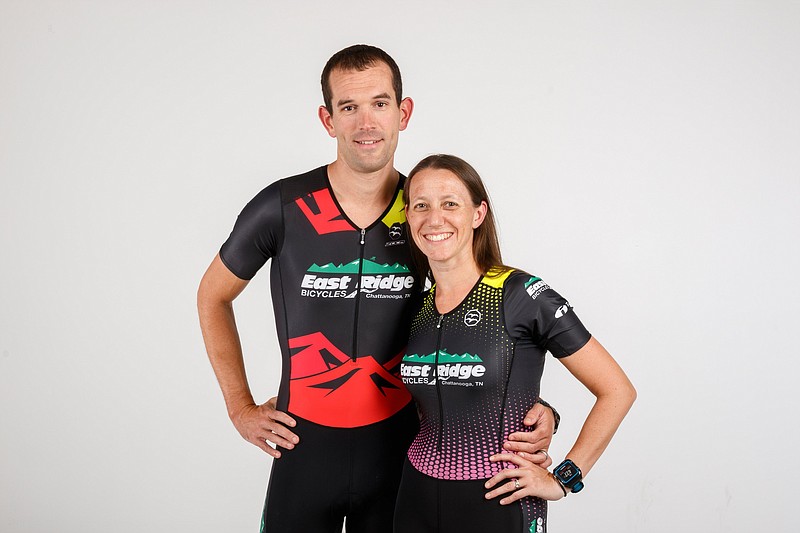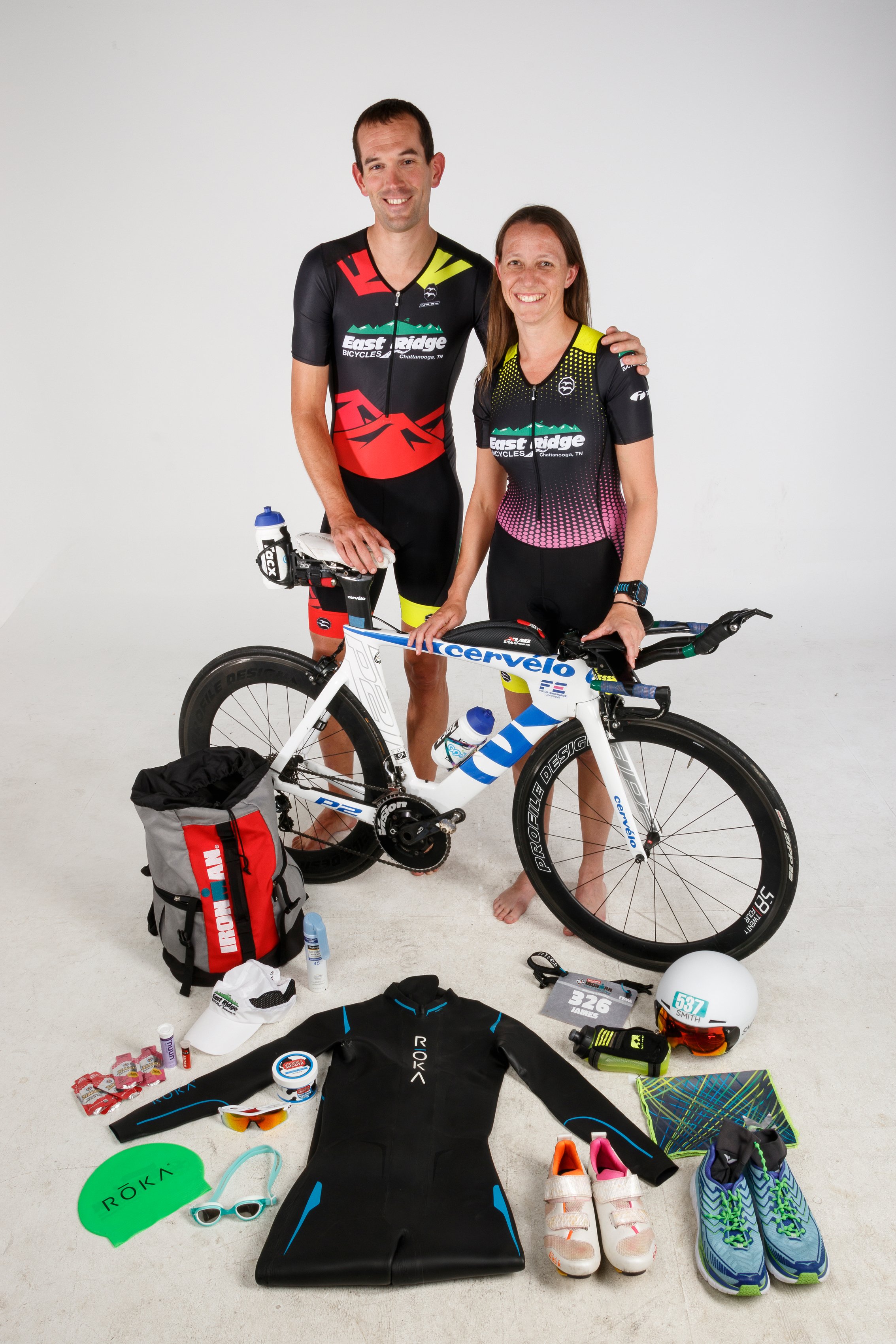Swim. Bike. Run.
That's the essence of a triathlon, but there are other factors Ironman athletes must consider that a casual observer may not.
Electrolytes. Food. Water. Tri-suit. Goggles. Swim cap. Wetsuit. Sunscreen. Towel. Sandals. Timing chip. And that's just to get racers through the 2.4-mile swim. There's still a 112-mile bike ride (116 for Chattanooga) and 26.2-mile run to follow.
Get Out met with local husband and wife James and Jenny DeLong to talk about the equipment and gear they will use for this month's Ironman Chattanooga. The couple has been racing Ironman events for about five years. Jenny, a nurse manager at Erlanger North, was first; James, a nurse (they met at nursing school), soon followed.
Jenny got into the sport shortly after the birth of their only child, a girl. Friends had recommended it, and she liked the idea of training for multiple events. Plus, she could push her daughter in a stroller while she ran, and the pool where she trained had child care services. James was racing bikes at the time and was ready for a change.
The couple has now raced a combined three full Ironman triathlons, 15 half-distance events and a number of other non-Ironman-branded races and shorter triathlons.
All the gear, race fees and travel costs make the sport expensive, but James coaches as a part-time job and the extra income more than pays for the couple's love of competing and healthy lifestyle.
"There's a vastly different amount people spend," James says of triathletes. "People can do it fairly cheaply, and some people drop 15, 20 thousand a year on it. It's not a cheap sport."
"And then in our family, we both do it," Jenny adds. "So, I mean, some of it is the same - we both share a hotel and drive together; but we both race."
Adding to the cost for the couple is James's obsession with shoes. "We have so many of them," says his wife.
"Yeah, I probably have 30 pair," he says lightheartedly, glancing at her.
"There's no need to mention that," she adds.
"Little bit of a sore subject," he says as they both laugh.
The two, both 36 this year, showcase the variability in the sport: Jenny is returning from a two-year hiatus after a stress fracture in her pelvis sidelined her. James coaches at Focus Endurance Coaching based in Chattanooga and is competitive in his age group. He averages 10-12 clients at a time, including his wife.
They'll both be racing in this month's Ironman Chattanooga. Here's a look at the gear they'll be using.
Swim - Ironman races can involve long waits before the start of the event. In Chattanooga, racers line up along the Tennessee River and start in waves. James and Jenny will wear flip-flops and bring a drink and snack for their time in line. The two typically avoid solid food during the race in favor of gels, preferably Stinger brand, but ultimately mimic their training menu.
They will then race with their tri-suits, chamois cream, wetsuits (Roka for him and Xterra for her: cost and flexibility are key, they say), Garmin watches and heart rate monitors, goggles, Ironman-provided swim caps and required timing chips that track racers. "You don't want to forget that. That wouldn't be good," Jenny says with a grin.
Bike - From the swim, James and Jenny will exit at Ross's Landing where volunteers will strip them from their wetsuits and hand them their pre-packed bag: a helmet equipped with a visor, cycling shoes, socks, nutrition and, for her, a sweatband. Other racers also often wear padded cycling gloves.
"Nutrition is crucial," James says. "So many people underfuel, and it goes downhill from there."
He recommends Ironman competitors take in 300-400 calories, 1,000 milligrams of sodium and about 40 ounces of fluid per hour during the race. His athletes use a range of products. Some only use gels while others use bars, and others, solid food. It's all about personal preference.
"The thing to stress is to practice with what you race with," Jenny notes.
Their bikes - they both race on white-and-blue Cervelo triathlon bikes - will be loaded with a water bottle between the aero bars, another on the downtube between the top of the bike and the pedals, and two more behind the seat. They put their electrolyte formula (they prefer the brand Nuun) in three of the bottles, and water in the bottle between the handlebars. Water and other nutritional items are also provided on course for those who wish to use them.
The couple each carry a repair kit in case of a flat tire, and a bento box filled with gels sits on the top tube of their frame.
Run - After the ride, they will drop off their bike and grab another transition bag with attire and supplies. They'll remain in their tri-suit but ditch the helmet and cycling shoes for a hat, sunglasses, running shoes and a water bottle. One of the keys is sunscreen.
"If you get burned in a long race, that's bad. Your body will overheat a lot worse if you get burned. It can't regulate the heat as well," James explains.
However, the biggest key to a successful Ironman comes before race day.
"It's a sport that rewards consistency," says James.
Consistent training and persistence lead to successful races. The hardest moments often don't come during the race, but in the months of training. It's about listening to your body.
"But maybe even more importantly than that, though, is having a balance, because your family and your job and your life will continue," says Jenny. "I was injured for two years and didn't race, and I was still happily married and had a job and had a kid."
"There's things more important than triathlon, that's for sure," James says. "It can become an unhealthy obsession. Absolutely."

